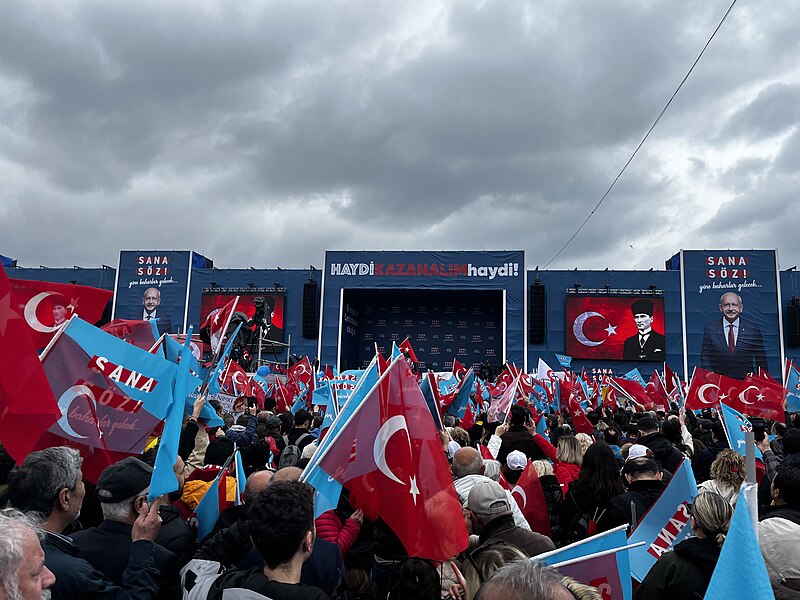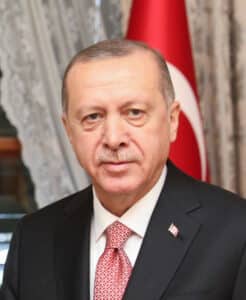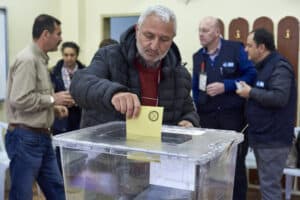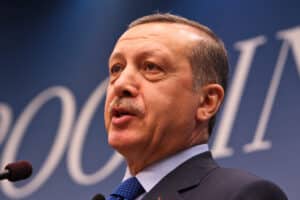Kemal Kılıçdaroğlu Istanbul Meeting, May 6, 2023: Kurmanbek
On 28 May, the first run-off since Türkiye transitioned from a parliamentary system to a presidential one, will determine the future course for Türkiye. Current President Tayyip Erdogan defied polls by receiving 49.51% of the votes, while his main rival Kemal Kilicdaroglu came second with 44.88% of the votes. The outcome will either reinforce President Erdogan’s firm control or open the path to a more democratic trajectory, promised by his main rival, Kemal Kilicdaroglu. This runoff election marks Erdogan’s first significant electoral challenge, as the nation faces with an escalating cost-of-living crisis that shows no sign of ending. The devastating earthquakes in February, which claimed the lives of over 50,000 people in the southern region, have further aggravated the country’s financial difficulties.
Polls were off
The polls of Türkiye’s election where not a resemblance to the actual result, with polls suggesting Kilicdaroglu would take the lead, resulting in a big surprise for markets and voters when Erdogan came ahead in the race. His strong election result was unexpected as his unorthodox low interest-rate policies created currency crashes in recent years and cost-of-living crisis as inflation soared above 85% last year. The forecasts for the runoff are being disregarded. Erik Meyersson, chief emerging markets strategist at SEB, said opinion polling in Türkiye can often by misleading. He said: “Voters may have engaged in signaling, to the extent that they indicated their displeasure with the government’s policies by upping the opposition in opinion polls but consequently supported the incumbent in the elections.” Erdogan’s emphasis on prioritizing national security interests over economic challenges seems to have resonated with a significant part of his conservative and nationalist supporters.
Last week, the opposition party Republican People’s Party (CHP) filed complaints over suspected irregularities at thousands of ballot boxes in the first elections. Muharrem Erkek, deputy chairman of the CHP, said they objected to 4,825 ballot boxes for the parliamentary elections and 2,269 ballot boxes for the presidential, even though they represent a small proportion of the total number. He said: “We are following every single vote, even if it does not change the overall results”. According to international observers of the OSCE, the general elections on 16 May were well-managed and offered voters a choice between genuine political alternatives. However, Franke Schwabe, head of the Parliamentary Assembly of the Council of Europe (PACE) said “Türkiye does not fulfill the basic principles for holding a democratic election. Key political figures are in prison even after judgments of the European Court of Human Rights, media freedom is severely restricted and there is a climate of self-censorship. Türkiye is a long way from creating fair election campaign conditions”.
Propaganda
The main opposition CHP’s media watchdog RTÜK member Tuncay Keser has said that the state television TRT News has been broadcasting government propaganda disguised as documentaries. The TV channel devoted one fourth of the day to government propaganda. However, in the last ten days before the day of voting, broadcasting in favor, or against a political party or candidate, or in a way that effects the vote of the citziens through written, oral and visual media, public opinion surveys, forecasts and any distribution is prohibited. Keser said “These ‘documentaries’ are classified as state commercials, they are free propaganda for the ruling Justice and Development Party (AKP). These acts constitute a very clear crime.”.
Dirty campaign
In the initial round of elections on May 14, there was already widespread dissemination of fake news concerning the opposition. However, head of the Turkish national committee for the International Press Institute (IPI), Emre Kizilkaya, said that Türkiye has experiences an unmatched level of organized disinformation during the runoff campaign. She said “Truth and factual information have come under a coordinated assault from multiple sources, with the government playing a central role in this troubling phenomenon, as evidenced by Erdogan’s tactics to tarnish the opposition through various channels.” The ongoing political campaigns are intensifying, and there is a noticeable rise in the circulation of fake posters targeting the CHP. One of these posters displays the CHP’s logo and carries the message: “To us, the YPG is not a terrorist organization. Decide now!” The YPG refers to the People’s Protection Units, a Kurdish militia in Syria closely associated with the Kurdistan Workers’ Party (PKK), which is recognized as a terrorist organization by Türkiye and several other countries. Teyit.org, a fact-checking organization, has analyzed these posters and confirmed that they are not part of the official election campaign of the CHP.
Following President Erdogan’s repeated claims that the PKK was providing support to Kilicdaroglu, the CHP has taken legal action by filling a criminal complaint against Erdogan and against who created and spread the video. The complaint stems from a montage video shared by Erdogan and falsely portrays PKK executives singing the campaign song of Kilicdaroglu. Erdogan accused Kilicdaroglu of relying on the PKK terrorist organization and disregarded the authenticity of the video. He said “The CHP leader relied on the PKK terrorist organization. It doesn’t matter if it’s a montage or not. PKK members supported the opposition with videos.” According to Guney Yildiz, researcher at the University of Cambridge this is against the Turkish law, which prohibits knowingly sharing false information for political gains. Additionally, the Erdogan administration consistently accused the CHP of engaging in “terrorist collaboration” due to its dialogues with the Peoples’ Democratic Party (HDP) and Kilicdaroglu’s pre-election commitment to seeking a peaceful resolution to the Kurdish conflict in Türkiye. According to Soner Cagaptay, senior fellow at the Washington Institute for Near East Policy, Erdogan’s strategy worked: “By referring to Kilicdaroglu as a not-good-enough Muslim and he support from terrorists, appealed to right-wing voters that were supposed to pick Kilicdaroglu.”
Kilicdaroglu´s hardened tone
Kilicdaroglu’s stance on immigrants hardened during the runoff. Before the initial elections he already pledged to repatriate Syrians on a voluntary basis within two years. In the runoff he took a much harsher approach and vowed to send all refugees back in two years, if he becomes President. During the runoff campaign, Kilicdaroglu made allegations against the government, claiming they had permitted the entry of 10 million “irregular” migrants into the country. He cautioned that the number of migrants could potentially rise to 30 million, but failed to present any supporting evidence to his claims. Additionally, Kilicdaroglu criticized Erdogan for his alleged failure to safeguard Türkiye’s borders and honor. Analyst Oznur Kucuker Sirene said that the anti-immigration sentiment will likely appeal to nationalist voters. He said “The alliance with the HDP did not win the election, on the contrary, they were greatly disappointed. It became apparent that the determining factor of the election was the nationalist voters.” Kilicadoroglu also accused Erdogan of working with terrorists as he points to the AKP for its cooperation with the radical Islamist Free Cause Party (HÜDA-PAR) The HÜDA-PAR has an affiliation with the radical Islamist Terrorist organization Hizbullah. Kilicdaroglu also accused Erdogan of working with terrorists. This references to peace efforts made between Erdogan’s government and PKK, which collapsed in 2015. Kilicdaroglu said: “I have never sat down with terrorist organizations, and I will never do.”
Relaxed Erdogan
In the parliamentary election the People’s Alliance, comprised of Erdogan’s AK Party (AKP) and its nationalist and islamist partners, won 322 of 600 seats in the new legislature, achieving a majority that enabled him to argue that voting for him will ensure stability. Erdogan said that Türkiye needs harmony between parliament and presidency for a functional governance. “It will be the people who will be the kingmakers, and when the people decide, I believe they will stand with those who have successfully served the Turkish nation for the last 21 years,” he said. Erdogan has also promised to send Syrians back, but has not put a timeline on it. He said: “The open truth is that the refugees, asylum seekers, and so on, we have now returned to their dormitories to start with briquette house in the north of Syria. But no, we have a plan that one million refugees will return to the target. Of course, this will happen over time.”
Ogan endorsed Erdogan
Sinan Ogan, the third-place election candidate, who took around 5% at the 14 May vote, announced the endorsement of Erdogan on 22 May, which was seen as an additional boost against Kilicdaroglu. Ogan emphasized that his campaign had successfully positioned Turkish nationalist as significant actors in politics. He states that Kilicdaroglu’s National Alliance had failed to persuade him about the future. He further clarified that the decision to support Erdogan was motivated by a persistent commitment to combat terrorism. However, when Ogan announced his endorsement of Erdogan, his alliance, behind him dissolved. A few days later, Umit Ozdag, leader of the Victory Party announced that he will support Kilicdaroglu. Ozdag said on a press conference with Kilicdarogu “We have reached a consensus on a model proposed by the Victory Party that will ensure the security of Syrians in Syria within 1 year, lift the great burden on the Turkish economy and make the streets safe. For this reason, as the Victory Party, we have decided to support Mr. Kılıçdaroğlu in the presidential elections.” For Kilicdaroglu’s endorsement, the CHP and the Victory Party signed a protocol laying out key principles of their cooperation.
However, the protocol between the opposition and the Victory Party has faced strong criticism from the People’s Demcoratic Party (HDP) and the Green Left Party (YSP). The provision that allows for the replacement of mayors with state-appointed trustees if there is a legal evidence of their involvement in terrorism, has ignited a heated debate. The HDP and YSPhave strongly condemned the protocol and stated “Appointing trustees who disregard the will of the people is unacceptable. It is our duty to protect the universal principles of democracy, the rule of law and respect for fundamental freedoms and human rights and not to make unprincipled concessions on this issue.” In the programme of Kilicdaroglu’s alliance, they vowed to end the practice of replacing mayors with government appointed trustees, emphasizing that elected officials will remain in office unless they are convicted by a court decision. Nevertheless, on May 25, the HDP and YSP reaffirmed their commitment to supporting Kilicdaroglu. In a press statement held at the HDP headquarters, the politicians emphasized that President Recep Tayyip is “never an option for us and the only option is to change him and the rulership he represents.”
Has Kilicdaroglu gone too far?
Kemal Bozay, an expert from the Center for Radicalization Research and Prevention at the International University of Applied Sciences said Kilicdaroglu’s appeal to the supporters of the ultra-right nationalist candidate Ogan was risky. He said “Kilicdaroglu shouldn’t forget that he was elected in big cities and metropolitan areas and in Kurdish strongholds by Kurdish people, leftist and progressive leaning voters.” He expressed concern that voters might not be inclined to support Kilicdaroglu’s hostile approach towards refugees. This frustration could potentially lead them to withhold from voting altogether Director of the Kurdish Studies Center, Reha Ruhaviogl, confirms this and said that there is a growing lack of enthusiasm among Kurdish voters leading up to the runoff election. He attributes this to a shift in the political discourse adapted by Kilicdaroglu, which has moved away from reconciliation and focused more on security politics. Even several members within the opposition alliance have resigned after the renewed pledges on sending refugees back. The signators, who called themselves Democrat Muslims said: “Here we openly declare to the public: We will not be on the side of those who defend anti-immigration in a way that will trample human dignity”.
Economic consequences
Türkiye is facing a potential economic crisis in the near future, as indiated by the decline in foreign reserves. Analysts warn that unless the government changes its course, the country could experience another economic crash this year, leading to even more inflation and a strain on its balance of payments. Over the past five years, the Turkish lira has lost almost 80 percent of its value against the dollar, largely due to Erdogan’s economic policies. Recently, the lira has reached new records lows, while indicators of investment risks have skyrocketed. Experts attribute part of the problem to Erdogan’s decision to keep interest rates low, which has resulted in an overheated economy due to the cheaper borrowing costs.
AKP divided on economic policies
Insiders report that Erdogan’s administration is divided and uncertain about the future direction of the country’s economic policies. In recent weeks, an informal group of ruling-party members has come together to explore the possibility of adopting a new strategy involving gradual interest rates increases and targeted lending program. On the other side of the debate, there are officials and cabinet members who publicly advocate for maintaining the current program, which focuses on boosting exports and economic growth through rate cuts and tightly managed forex, credit, and debt markets. The informal group is not considering aggressive monetary tightening, but rather a more gradual approach that emphasizes the policy rate in lending markets. Several ideas are being explored, and the opposing group has yet to present the plan to Erdogan. As Erdogan seeks a third term as President, concerns about managing Türkiye’s declining currency and the rising cost of living have reached higher than ever.
Despite the possibility of Kilicdaroglu winning the presidency, Erdogan’s alliance secured a parliamentary majority on 14 May, making it extremely difficult to enact reforms. If Erdogan wins the runoff, it is expected that he will further consolidate his authoritarian style of governance. This outcome could also weaken the opposition, as there are indications of potential leadership struggles within the two main opposition parties.
Runoff could be decided abroad
The runoff could be decided by the more 3.4 million Turks who are eligible to vote who casted their vote abroad in the second round off. Erdogan has gained more support among this group compared to his domestic support, with 57.5% of Turks living abroad voting for him in the first round. Erdogan garnered significant support from the two largest European diaspora communities, comprising 1.5 million voters in Germany and 400.000 voters in France. Additionally, long-established Turkish communities in countries as the Netherlands and Belgium also voted overwhelmingly in favor of Erdogan. In smaller and more novel communities in Europe, such as the Baltic states Kilicdaroglu is the favourite.
Author: Manouk Bronzwaer



